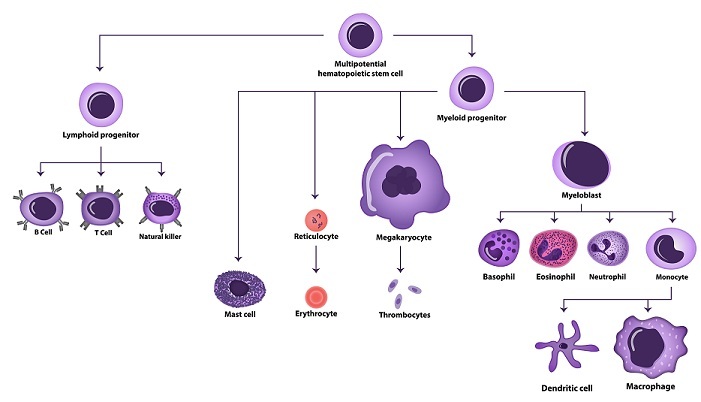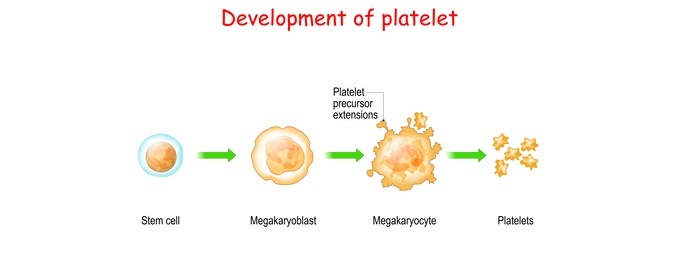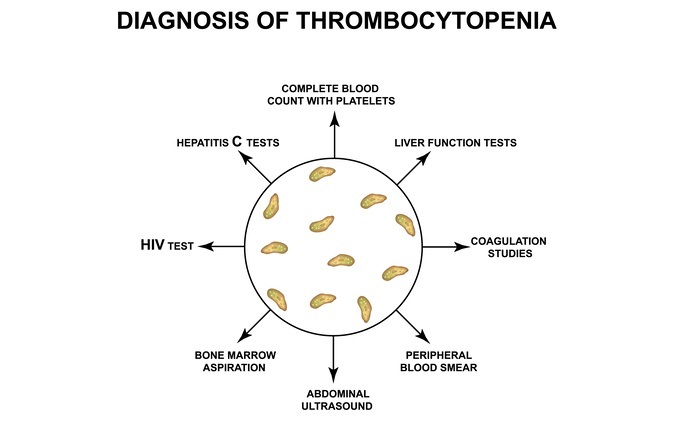
 Data Structure
Data Structure Networking
Networking RDBMS
RDBMS Operating System
Operating System Java
Java MS Excel
MS Excel iOS
iOS HTML
HTML CSS
CSS Android
Android Python
Python C Programming
C Programming C++
C++ C#
C# MongoDB
MongoDB MySQL
MySQL Javascript
Javascript PHP
PHP
- Selected Reading
- UPSC IAS Exams Notes
- Developer's Best Practices
- Questions and Answers
- Effective Resume Writing
- HR Interview Questions
- Computer Glossary
- Who is Who
Megakaryocytes - Development, Function, and Clinical Significance
Introduction
Megakaryocytes are large cells found in the bone marrow that are responsible for producing platelets, which are essential for blood clotting. They are named for their large size, with a diameter ranging from 30 to 100 micrometers, and are classified as a type of hematopoietic cell, meaning they originate from stem cells in the bone marrow.
Megakaryocytes are large, multinucleated cells that are responsible for producing platelets, which are essential for coagulation of blood. They are unique among bone marrow cells due to their enormous size, and their ability to undergo endomitosis, where they replicate their DNA without cell division, resulting in a cell with multiple nuclei.

These specialized cells are vital for maintaining the body's hemostatic balance, and defects in megakaryocyte function can lead to a range of bleeding disorders.
Development of Megakaryocytes
Megakaryocytes are developed from hematopoietic stem cells in a process known as megakaryopoiesis. This process is controlled by a number of cytokines, such as thrombopoietin, which stimulates the proliferation and differentiation of megakaryocytes.
As the cells develop, they undergo a process of endomitosis, where the nucleus replicates without cell division, resulting in cells with multiple nuclei. Their roles include,
Platelet Production
The primary function of megakaryocytes is to produce platelets. These small, disc-shaped cells are essential for blood clotting, and are formed from the fragmentation of megakaryocyte cytoplasm. Each megakaryocyte can produce thousands of platelets.

Regulation of Angiogenesis
Megakaryocytes have also been found to play a role in regulating angiogenesis, the process of new blood vessel formation. They release a number of factors that can stimulate the growth of blood vessels, such as vascular endothelial growth factor (VEGF) and platelet-derived growth factor (PDGF).
Immune System Regulation
Recent research has also suggested that megakaryocytes may play a role in regulating the immune system. They can interact with immune cells such as T cells and dendritic cells, and release cytokines that can modulate immune responses.
Modulation of Immune Responses
Megakaryocytes have also been implicated in the regulation of immune responses.
They have been found to express a variety of immune-related molecules, such as major histocompatibility complex (MHC) class II molecules, co-stimulatory molecules, and cytokines. These molecules allow megakaryocytes to act as antigen-presenting cells, presenting antigens to T cells and initiating immune responses.
In addition, megakaryocytes can produce proinflammatory cytokines, such as interleukin-6 (IL-6), tumor necrosis factor-alpha (TNF-?), and interleukin-1 beta (IL-1?), which can influence the activity of immune cells.
Megakaryocytes and Bone Homeostasis
Bone is a dynamic tissue that is constantly being remodeled by a balance between bone formation and resorption. Recent studies have shown that megakaryocytes can influence bone homeostasis by regulating the activity of osteoblasts, the cells that produce bone matrix, and osteoclasts, the cells that resorb bone.
Megakaryocytes produce factors that stimulate the differentiation and activity of osteoblasts, leading to increased bone formation. They also produce factors that inhibit the activity of osteoclasts, leading to decreased bone resorption.
In summary, megakaryocytes play multiple roles in the body, including platelet production, regulation of angiogenesis, modulation of immune responses, and regulation of bone homeostasis. Understanding these functions is important for the diagnosis and management of hematologic and bone disorders.
Clinical Significance
Megakaryocytes seem to be having the following significance in our body ?
Thrombocytopenia
Thrombocytopenia is a condition characterized by low platelet counts in the blood. This can be caused by a number of factors, including decreased production of platelets by megakaryocytes. Patients with thrombocytopenia are at increased risk of bleeding.
Myeloproliferative Neoplasms
Myeloproliferative neoplasms (MPNs) are a group of blood cancers that involve the overproduction of certain blood cells, including megakaryocytes. This can lead to a number of symptoms, such as fatigue, night sweats, and enlarged spleen. Clinical Significance ?

In addition to bleeding disorders, megakaryocyte dysfunction has also been implicated in the development of some cancers, including acute megakaryoblastic leukemia and myeloproliferative neoplasms. These disorders are characterized by the abnormal proliferation of megakaryocytes and other bone marrow cells, leading to the production of abnormal blood cells and the development of symptoms such as fatigue, fever, and weight loss.
Megakaryocytes as Surface Markers
Megakaryocytes have been identified as useful surface markers for the diagnosis and monitoring of certain blood disorders. For example, in patients with chronic myeloid leukemia, the presence of megakaryocytes in the blood can be used to assess disease progression.
Recent Research
Recent research has focused on the role of megakaryocytes in regulating immune responses. Studies have shown that megakaryocytes can interact with immune cells such as T cells and dendritic cells, and release cytokines that can modulate immune responses. This suggests that megakaryocytes may play a role in the development of autoimmune diseases and other immune-related disorders.
Recent research has shed new light on the functions of megakaryocytes and their potential therapeutic applications. One area of research has focused on the role of megakaryocytes in bone homeostasis. Studies have shown that megakaryocytes produce factors that promote bone formation and inhibit bone resorption, making them potential targets for the development of new therapies for bone disorders such as osteoporosis.
Another area of research has focused on the use of megakaryocytes in regenerative medicine. Megakaryocytes have been shown to produce factors that promote tissue repair and regeneration, making them potential candidates for the development of new treatments for conditions such as heart disease and stroke.
Additionally, recent research has identified new markers of megakaryocyte differentiation and maturation, which could aid in the diagnosis and monitoring of hematologic disorders. For example, the presence of specific megakaryocyte surface markers has been shown to be a useful diagnostic tool in the differentiation of acute megakaryoblastic leukemia from other types of acute myeloid leukemia.
Megakaryocytes play a critical role in the maintenance of hemostasis, the process of preventing and stopping bleeding. The clinical significance of megakaryocytes primarily lies in their function in the production of platelets, which are crucial in the formation of blood clots.
In addition to their role in hemostasis, megakaryocytes also have other clinical implications. For example, megakaryocytes have been found to be involved in the development of bone metastases in cancer. They release factors that promote bone resorption, which can lead to the spread of cancer to the bones. Additionally, studies have shown that megakaryocytes can modulate immune responses, suggesting a potential role in the development of autoimmune disorders.

